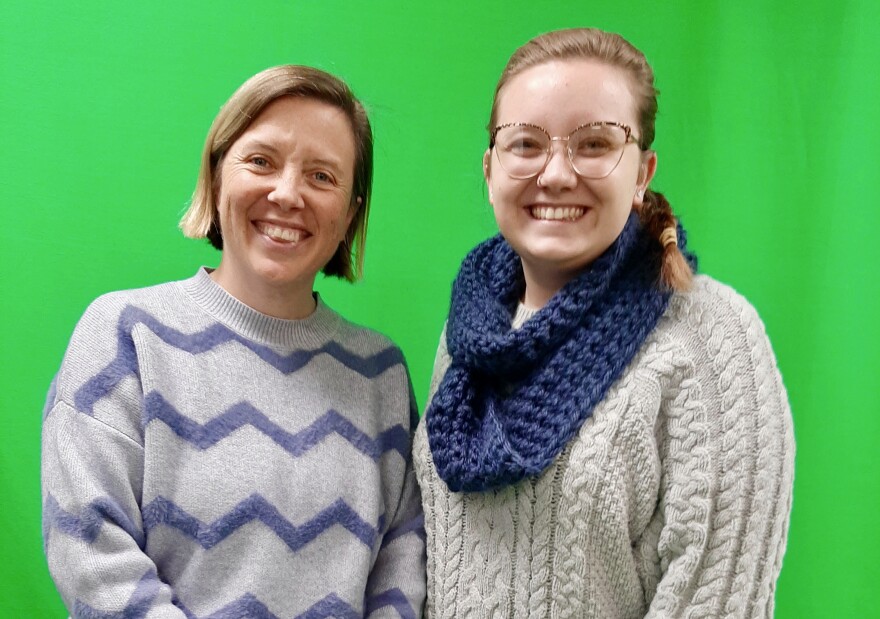Before the coronavirus pandemic, County Lines producer Renee Wilde met with faculty and students at Wilmington College in Clinton County and heard their ideas about rural life and the prospects for a career in agriculture.
Corey Cockerill teaches Agricultural Communications at Wilmington College, but she didn’t live in a rural area until about 10 years ago. Corey grew up in the city of Mount Vernon, but when she went away to college - she met and fell in love with a farmer. Corey now lives on a farm and is raising two young children in his remote hometown of just over a thousand residents. Senior Aryn Copeland interviews her professor, Corey Cockerill, about that journey from the suburbs to rural life.
Transcript:
ARYN COPELAND: Hello, this is Aryn Copeland. I am a senior at Wilmington College studying agricultural communications with a minor in sustainability. And today I am interviewing…
COREY COCKERILL: Corey Cockerill. I am an associate professor of communication arts and agriculture at Wilmington College.
COPELAND: So just before our interview, you reminded me that you have not always had a rural upbringing. You’re originally from the suburbs. Can you tell us a little bit about what your journey to rural life was like
COCKERILL: I grew up in Mt. Vernon, Ohio, which is north of Columbus. Growing up I definitely had the suburban experience.
I lived in a community that was relatively large. It was a city and we lived in town. We just had a small backyard and a dog. (laughs)
So I remember when I was nine years old and I wrote down on a piece of paper that ended up in a time capsule - I wanted to be a dairy farmer in Wisconsin, and to be a vegetarian (laughs).
I stayed a vegetarian, ironically until I met my farmer husband, and he was from a rural community in south western Ohio, and ultimately we moved there.
So I remember being nervous when I knew that we were going to be moving to Leesburg. I drove the town, village, it’s a village. So I just remember thinking, how are we going to get what we need here?
I was also nervous about sending my children to school. At the time we had a five year old who was about to enter kindergarten. You know, what is a small school like? What does that mean?
In the end, I’m just thrilled to be a resident of Leesburg, Ohio. I say it very proudly.
You know, having kids in a small school is just the best experience because the teachers get to know them, they get to know each other. It takes a village to raise a child and we truly have that.
We don’t just have that in the village, but also in the schools and anywhere else they roam. And it’s an incredibly powerful experience to be part of a giant family that would do anything for you or your kids.
That feels more reassuring than anything else.
COPELAND: So you talk a lot about how people come together and they use their voices to make a change, when change is necessary.
How have you personally used your voice and your influence in this new rural community that you call home, to make a difference in the lives of others. Especially the youth.
COCKERILL: So coming into a rural community I was definitely an introvert, forced to be an extrovert. I didn’t engage as much, but when you move to a rural community you have to engage.
And so you kind of look around and say, well here’s what I’m capable of.
Here’s my skill set. This village needs me, so what can I do for it?
You have to ask that.
And apart from offering some home roasted coffee, I could also offer grant writing skills. So recently I’ve been working on a sidewalk grant for the local school to try and get a safe pathway to and from school.
COPELAND: Do you think your children are getting some things, like a benefit, that you didn’t have when you were growing up in a suburban/urban area?
COCKERILL: I have to say that the first thing I think they’re getting is the opportunity to develop empathy.
They are seen as a resource, an asset to the community, even as young people. I love that. And they’re forced to have interactions, because you can’t walk somewhere without someone talking to you in a rural community, and in making conversations, you build empathy for people.
You learn how to listen to other people and listen to their stories.
The challenges I think we face are like the challenges of other rural communities and that is exposure to diversity. They’re limited (to) exposure, so I do worry about that.
Also rural communities are dealing right now with a lot of addiction. A lot of depression. High suicide rate among farmers. And we’re raising our kids in this hostile, high risk, situation. So we’re working really hard to protect them.
So I guess that’s a pitfall, but man all the benefits outway those, time and time again.
County Lines is WYSO's series on rural life, made possible by a grant from Ohio Humanities. This story was created at the Eichelberger Center for Community Voices at WYSO.



